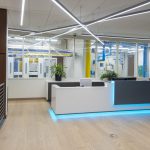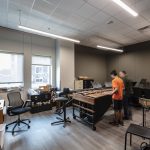The Farnam Hotel Wins ACEC Merit Award
ACEC Nebraska recognizes exceptional engineering projects across the country every year. This year during Engineers Week, the organization announced the 2022 Engineering Excellence Awards, including Alvine Engineering’s Merit Award for The Farnam Hotel. Check out how our talented team of engineers designed the mechanical and electrical systems and overcame challenges throughout this space.
A UNIQUE APPROACH
The Farnam Hotel is a new tenant fit-out located within the existing Landmark Center in the heart of downtown Omaha. New ownership of the existing Landmark Center decided to repurpose several of the vacant floors of traditional office space into a new boutique downtown hotel; however, the vacant office floors were not contiguous in the building. At first, owners considered relocating office tenants so the hotel floors could be contiguous, but that proved to be cost prohibitive.
Instead, they decided to move forward with a unique boutique hotel located on non-contiguous floors. The basement houses laundry, hotel staff office space, as well as hotel employee locker rooms and break areas. The first two levels of the building include the lobby and amenity areas, including restaurants, banquet spaces, and a fitness center. The actual hotel rooms, however, are located on levels 6,7,10, and 11. In order to accomplish this, the elevators were modernized and converted to destination dispatch elevators, which group passengers going to similar destinations into one elevator.
Originally designed to function as an office space, the floor-to-floor height was generous for the hotel room floors, but was not ideal for the hotel amenity spaces on the second level. However, the Alvine Engineering team was able to overcome this challenge using an indirect glow atop the wood ceiling panels to create a luminous ceiling effect that helps the space feel taller. This limited ceiling height was especially difficult in the large banquet hall, which significantly limited the options for lighting. To address this obstacle, the team provided lighting for a small cove within the ceiling plane to provide the illusion of additional height in the space.
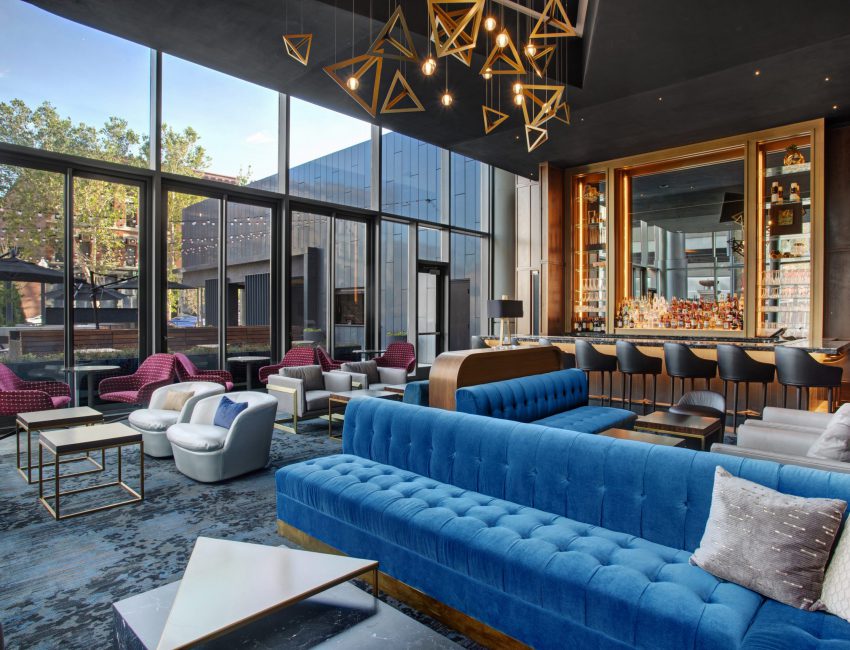
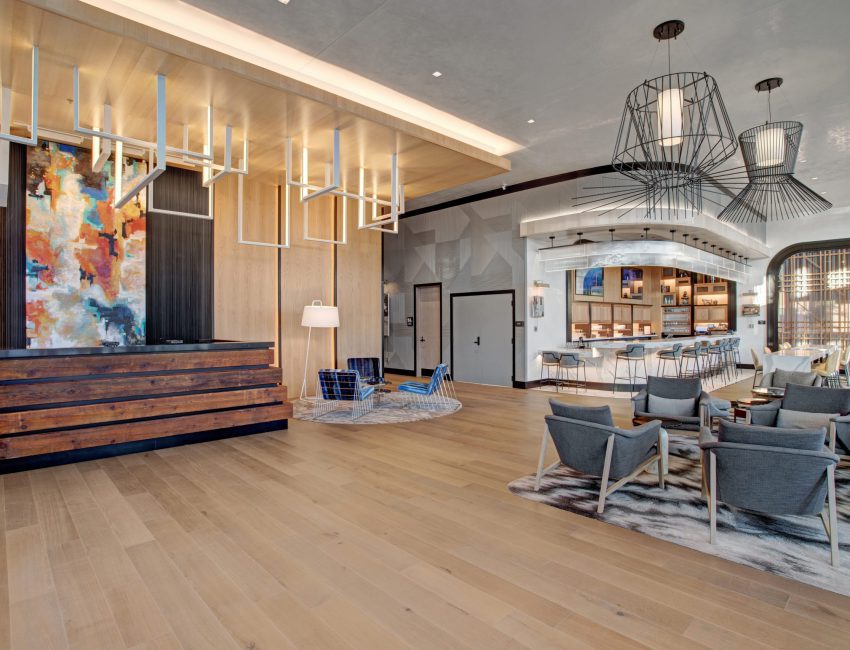
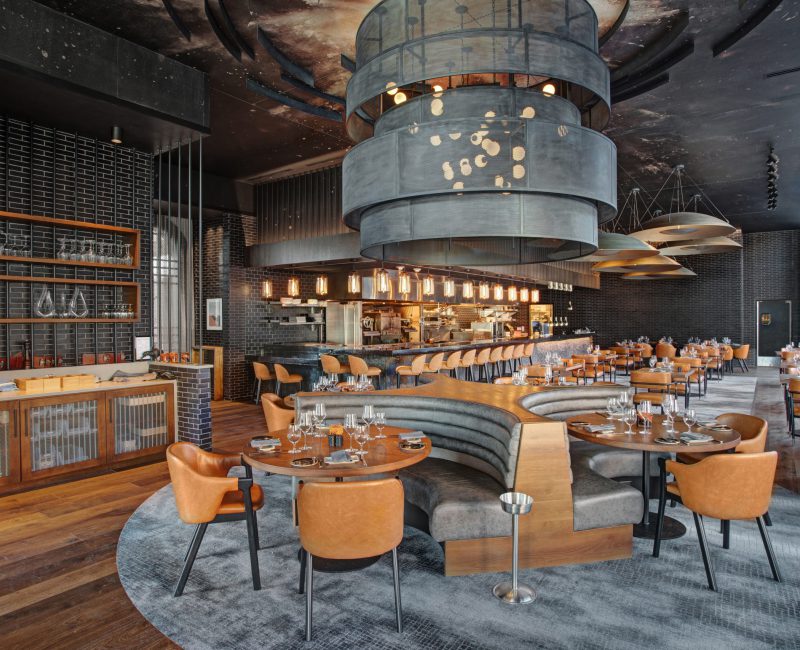
FUTURE VALUE
The COVID-19 pandemic changed many things, including how people think about where they work. Many companies are rethinking large, traditional office buildings. As a successful adaptive reuse project, The Farnam Hotel provides an example of how existing buildings can adapt to the needs of an ever-changing market. By sharing their creative engineering solutions for challenges, such as nonconsecutive floors, Alvine Engineering is helping to push building owners to rethink reuse. Giving existing buildings new life not only saves money, but saves the environment from the negative effects of material waste, too.
The Landmark Center is now used 24/7 and provides a great connection between some of downtown Omaha’s most iconic landmarks. The new plaza space helps connect the Old Market area to the Gene Leahy Mall, which is currently being renovated. Upon completion, of the Gene Leahy Mall the restaurant in the Landmark Center will provide visitors with one of the best views of the city’s reimagined heart.
SUSTAINABLE DESIGN
The Landmark Center is tied into the downtown district energy system (DES) provided by Clearway Energy. This allowed The Farnam Hotel to remove large central plant equipment, benefitting the project aesthetically and spatially. Removing all of the central plant equipment opened up valuable space within the building for other functions and equipment. Sharing utilities with other downtown businesses reduces negative impacts on the environment associated with energy production, reduces maintenance requirements on large central plant equipment, and provides reliability for heating and cooling systems.
It was important to the Owner that the building creates a safe, healthy environment for guests, and office tenants, as well. For this reason, the building incorporates high levels of filtration, including a dynamic air filter on the large outside air unit. Additionally, bipolar ionization units (air-cleaning devices) were installed on the air handling units serving the amenity levels and the office floors The Farnam Hotel is the first hotel in Omaha to invest in needlepoint bipolar ionization (NPBI) technology that neutralizes indoor air contaminants and helps keep the air cleaner.
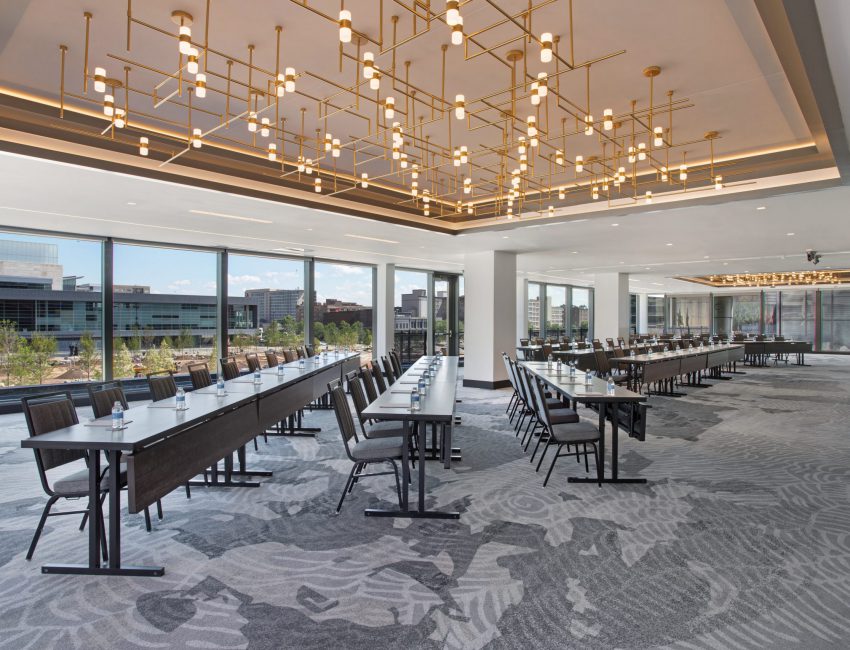
COMPLEXITY
Throughout construction, the building continued to serve office tenants, so it needed to maintain operability, which made design and construction phasing more challenging. The elevator modernization needed to be completed early in the project so the office tenants could easily access their spaces while staying safely away from construction areas. The non-contiguous hotel floors also meant that plumbing and other infrastructure work needed to occur in the ceiling space of the occupied office levels. Alvine intentionally designed the project such that the amount of construction needed within the office floors below the hotel floors was limited. The construction that did take place was staged so that it could be completed outside of normal business hours when office tenants were not occupying the space.
The existing conditions within the building provided challenges due to low clearances in certain areas of the building like the second-floor banquet spaces and the kitchen and restaurant areas. This required the Alvine Engineering team to get creative when designing and routing systems such as ductwork. The addition of two restaurants on the ground floor posed a significant challenge regarding grease exhaust. Traditionally, grease exhaust would be routed out of the building at the roof level, which was not a viable option because of the existing nature of the building.
Instead, the Alvine team routed grease exhaust to the south side of the building while being mindful of the intake air pathways also located at that side of the building. To create separation, a structure was built on the south side of the building to house the multiple exhaust fans required for the large kitchens. The design team then took what could have been an eyesore and turned it into an inviting outdoor cabana space. Each cabana features an individual radiant heater so that the space can be enjoyed throughout the year.
ON TIME AND ON BUDGET
The owners of The Farnam Hotel recognized the Omaha community’s need to bring new life to the Landmark Center and a downtown boutique hotel. The renovation projects to the Gene Leahy Mall, Heartland of America Park, and Lewis and Clark Landing are revolutionizing the downtown aesthetic over the next few years and attracting public interest. The Landmark Center was a concern for the City because a majority of the building was vacant before the hotel renovation. While the exterior aesthetic fit with the rest of the downtown revitalization, the lack of business did not. The Farnam Hotel not only opened in time to host guests for the Olympic swim trials and Men’s College World Series in summer 2021, but has continued to see substantial business ever since, bringing new life to the building and surrounding areas.
Alvine Engineering also handled all of the architectural lighting for the indoor/outdoor bar space on the south side of the building. From a lighting standpoint, the space needed to be inviting to pedestrians in the Old Market area to bring in customers and support the restaurant, while also creating the ambiance the owner was looking for at the same time. The festoon lighting strung overhead helps grab the attention of those from the street, while providing the look and feel the owner wanted. The glow of the custom, interior feature chandelier likewise helps to capture the attention without detracting from the overall atmosphere of the lounge space.
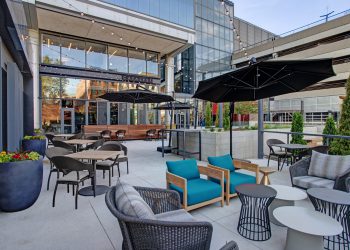
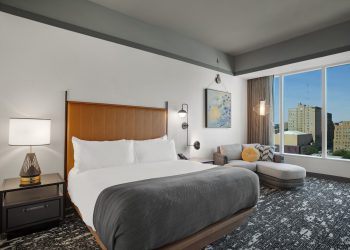
Congratulations to all the 2022 ACEC Engineering Excellence Awards winners, including IP Design Group’s submission for the Metropolitan Community College’s Automotive Training Center. Alvine Engineering is proud to support ACEC Nebraska and its mission to provide engineering firms with the tools and educational opportunities to be better business owners and managers.


